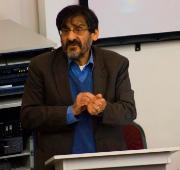
YOU don’t make democracy work by putting it on hold. This is why the African National Congress (ANC) won’t have a functioning youth wing until its leaders are elected by members.
Last week, the ANC ducked out of allowing the ANC Youth League to elect leaders by turning its elective congress into a gathering to discuss policy. The likeliest reason is that it didn’t want former treasurer Pule Mabe elected president because he is facing fraud charges. With the conference delayed until next year, he will be older than 35 when it takes place and ineligible to serve. Another possibility is that it realised that, if an election was held, the conference would be torn apart by conflict between supporters of rival candidates. Either way, the fact that it did not hold an election shows that the attempt to fix democracy by placing it on ice has failed.
To understand why, we need to go back to early 2012, when the league’s president, Julius Malema, was expelled from the ANC and its leadership was dissolved. Those who romanticise the Malema league might care to remember its state then. He and his supporters were elected once after most provinces insisted that the election was not fair. The second time, they were elected unopposed after their opponents were chased out of a hall in Limpopo and a court order was ignored in the Eastern Cape. During their tenure, provincial executive committees that challenged them were dissolved.
Media reports claimed that league leaders did well out of eroding democracy — all were reported to have substantial business interests. At the second conference, media reported that delegates (most from the leadership’s faction that had driven opponents away) insisted that there was nothing wrong with being a "tenderpreneur" — someone who benefits personally from public funds. So democracy in the league had decayed; it seemed to have become more a vehicle for people who wanted to get rich than for those who wanted to say something.
At that stage, the ANC leadership could have tackled the problem by holding elections to choose new league leaders. It insisted, rather, that the league was in no condition to do this; it was so damaged, it insisted, that time was needed to restore it to a state fit enough to allow for fair elections. A task team was appointed to do this.
Last week’s failure to hold an election means that, after more than two-and-a-half years, the task team has not yet fixed the problems sufficiently to allow leaders to be elected. Why should a process that has had that long to work but has still failed succeed at any time in the future?
The problem, of course, is not that the task team process has not had enough time to work — it is that it was the wrong solution. The claim that fair elections were impossible then is questionable — an independent organisation could have been hired to ensure fair elections for branch delegates and then at the conference where leaders were elected. Even if the process was less than perfect, as long as it produced a result losers could accept (or at least challenge without seeming like bad losers), it would have given a leadership a mandate to begin rebuilding the league.
Obviously, given the ravages of the past few years, there was no guarantee that new elected leaders would succeed. But, if they failed, the fact that they were elected meant that they could be held to account in a way a task team that is only meant to be holding the fort cannot. Elections might not have been a miracle cure, but they offered far better prospect of fixing the league’s problems than repeatedly putting democracy off to another day. They still do.
The belief that democracy is dispensable is not peculiar to the ANC — it is widespread in this society. We are repeatedly told that, in many areas of public life, technical skills are more important than the public’s voice: the league’s experience shows this view’s flaws.
More immediately, the league’s experience applies to another organisation — the Congress of South African Trade Unions (Cosatu). Its central executive has, throughout its internal dispute, resisted calls for a special congress. Now it seems a congress may be held, but ANC secretary-general Gwede Mantashe has warned that it should not be used to fight "factional battles".
That could be an understandable warning against another congress in which one faction imposes itself on others. But it could also be used to delay a congress indefinitely for fear that it will be used to fuel "factionalism". A special congress could be a difficult event at which tensions become even more obvious. But the youth league’s experience suggests that this is a price Cosatu needs to pay to avoid the decay which sets in when differences are not settled through fair elections.
Yes, democracy is risky when people are at each other’s throats — the use of money to shape results is a danger. But it offers a hope of progress, while denying people a chance to express themselves offers none.
By Steven Friedman
Source: Business Day
• Friedman is director of the Centre for the Study of Democracy.
